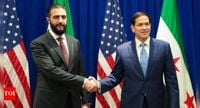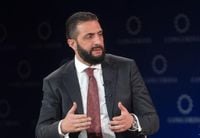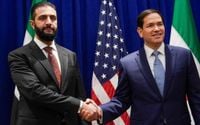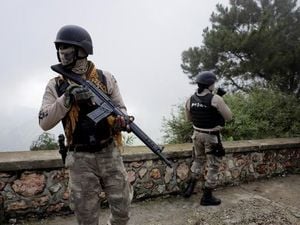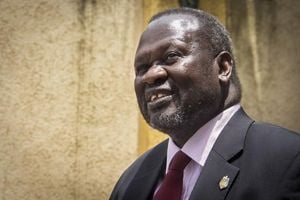On Monday, September 22, 2025, a momentous meeting unfolded in New York City: Syrian President Ahmad al-Sharaa sat down with U.S. Secretary of State Marco Rubio on the sidelines of the United Nations General Assembly (UNGA). This encounter, held at the Lotte New York Palace Hotel, marked a significant pivot in Syria’s long and turbulent relationship with the West, signaling a possible new chapter after decades of isolation and civil war.
Al-Sharaa’s presence at the UNGA was itself historic. According to the Associated Press, he became the first Syrian leader to address the world body since 1967—before the Assad family’s half-century grip on power. That long absence ended only after a lightning insurgent offensive led by al-Sharaa ousted Bashar al-Assad in December 2024, closing the book on nearly 14 years of civil war and the Baath Party regime that had ruled for a quarter-century. Al-Sharaa’s transitional administration was formed in January 2025, and his trip to New York was a highly visible step in Syria’s effort to rejoin the international community.
The meeting with Rubio was confirmed by both the U.S. State Department and Rubio himself, who posted on X, “I met with Syrian President al-Sharaa about our shared goals for a stable and sovereign Syria and ongoing efforts to bring security and prosperity to all Syrians. We also discussed implementing President Trump’s historic announcement on sanctions relief and the importance of Israel-Syria relations.” The Times of Israel added that the two leaders discussed ongoing counterterrorism efforts, the search for missing Americans, and the critical matter of Israel-Syria relations, which has long been a source of regional tension.
This diplomatic thaw comes on the heels of major policy shifts in Washington. President Donald Trump’s administration, in a move described by al-Sharaa as “quick, courageous, and historic,” lifted broad U.S. sanctions on Syria in July 2025 after a May meeting with al-Sharaa in Saudi Arabia. By August, the Treasury Department had authorized American companies to resume business with Damascus, though some penalties remain under a 2019 U.S. law that sanctioned the Assad government for war crimes during the civil war. The State Department emphasized that Trump’s sanctions relief was intended to help Syria become a stable and sovereign nation after years of chaos.
Despite these positive signals, the road ahead is far from straightforward. Al-Sharaa, who once led Hayat Tahrir al-Sham (HTS)—a group previously designated by the U.S. as a terrorist organization—has worked to reset Syria’s ties with Arab states and the West. The Trump administration’s decision to remove HTS’s terrorist designation and ease sanctions was seen as a bid to help Syria re-emerge as a regional player. Still, al-Sharaa’s past has made some Western officials wary, and skepticism remains among U.S. lawmakers and international observers.
One of the thorniest issues on the table is Syria’s relationship with Israel. According to a U.S. State Department readout cited by The Times of Israel, the United States is hoping to broker a security deal between Israel and Syria to ease border tensions and, perhaps, lay the groundwork for normalization. While there was speculation that such a deal could be finalized within days, Israeli Prime Minister Benjamin Netanyahu indicated more time would be needed, underscoring the complexity of the negotiations.
At the Concordia Annual Summit in New York, al-Sharaa addressed these challenges head-on. In conversation with retired U.S. General David Petraeus, he drew a sharp distinction between Syria and the countries that joined the Abraham Accords, the U.S.-brokered agreements that saw several Arab states normalize relations with Israel. “There’s a big difference between Syria and those members in the Abraham Accords. Syria is different… Syria, as a neighbor, has been subjected to over 1,000 raids, strikes and Israeli incursions,” al-Sharaa said. He added that current talks with Israel were focused on reviving the 1974 truce line, rather than full normalization. “Syria has to be respected in this new era. There are different phases of negotiations with Israel to go back to the truce of 1974.”
Al-Sharaa’s remarks at the forum also included a direct appeal to Washington. Praising Trump’s decision to ease sanctions, he urged the United States to lift all remaining restrictions, warning, “The Syrian people should not be killed another time through the sanctions… Lift the sanctions, and don’t worry about them.” He framed this as a humanitarian imperative, arguing that the Syrian people, weary from years of war, “love work” and need economic relief to rebuild their lives.
The push for further sanctions relief has found some support in Congress. During his New York visit, al-Sharaa met with Senator Jeanne Shaheen and Representative Gregory Meeks, both senior Democrats on the foreign relations committees. Shaheen, according to a Senate committee statement, underscored her commitment to advancing legislation that would lift remaining penalties on Syria—a sign that bipartisan interest in re-engagement is growing, even if it remains cautious.
Accountability and human rights remain pressing concerns as Syria emerges from conflict. For the first time in 60 years, Syria has allowed international fact-finding teams into the country, a move welcomed by Western governments. Al-Sharaa acknowledged the gravity of past atrocities, especially those committed against minorities in the coastal region and the southern province of Sweida. “There was major chaos and everyone made mistakes,” he said, but insisted, “The Syrian state will work on accountability against those found guilty, even if they were the closest people to us.” This promise of accountability, if carried out, could help Syria rebuild trust with the international community.
Still, the path to full normalization is fraught with challenges. Many of the U.S. sanctions that remain in place stem from the Assad era and are linked to war crimes and human rights abuses. Some in Congress and among advocacy groups remain deeply skeptical of Syria’s intentions and the pace of reform. At the same time, the U.S. State Department had to waive longstanding visa restrictions just to allow al-Sharaa and his delegation to attend the UNGA—a reminder of the lingering distrust and the legal hurdles that persist.
For now, the flurry of diplomatic activity in New York suggests a willingness on all sides to explore new possibilities. Discussions on a security arrangement between Syria, the U.S., and Israel could be finalized in the coming days, though nothing is guaranteed. Al-Sharaa’s willingness to engage with both Republican and Democratic lawmakers, as well as his openness to international oversight, marks a significant departure from the secretive and confrontational posture of the Assad years.
As the world watches, Syria stands at a crossroads. The outcome of these talks—and the actions that follow—will determine whether the country can truly move beyond its troubled past and carve out a new role on the world stage. For now, the doors to dialogue are open, and the stakes could hardly be higher.
